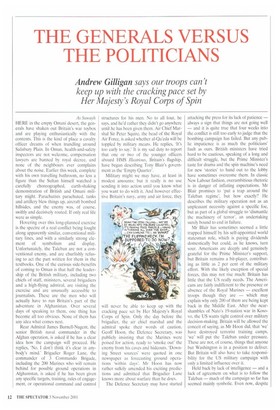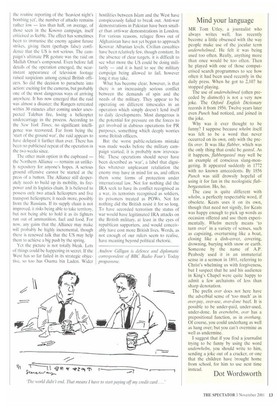THE GENERALS VERSUS THE POLITICIANS
Andrew Gilligan says our troops can
keep up with the cracking pace set by Her Majesty's Royal Corps of Spin
As Suwayh HERE in the empty Omani desert, the generals have shaken out Britain's war toybox and are playing enthusiastically with the contents. This is the kind of place a cavalry officer dreams of when trundling around Salisbury Plain. In Oman, health-and-safety inspectors are not welcome, compensation lawyers are banned by royal decree, and none of the neighbours ever complains about the noise. Earlier this week, complete with his own travelling bathroom, no less a figure than the Sultan himself watched a carefully choreographed, earth-shaking demonstration of British and Omani military might. Parachutists parachuted, tanks and artillery blew things up, aircraft bombed hillsides, and the enemy was, of course, swiftly and decisively routed. If only real life were as simple.
Hovering over this long-planned exercise is the spectre of a real conflict being fought along apparently similar, conventional military lines, and with a similarly strong element of symbolism and display. Unfortunately, the Taleban are not a conventional enemy, and are churlishly refusing to act the part written for them in the textbooks. One of the curious side-benefits of coming to Oman is that half the leadership of the British military, including two chiefs of staff, ministers, several brigadiers and a high-flying admiral, are visiting the exercise and are unusually accessible to journalists. These are the men who will actually have to run Britain's part of the adventure in Afghanistan. Over several days of speaking to them, one thing has become all too obvious. None of them has any idea what comes next.
Rear Admiral James Burnell-Nugent, the senior British naval commander in the Afghan operation, is asked if he has a clear idea how the campaign will proceed. He replies, `No. I don't think it's clear in anybody's mind.' Brigadier Roger Lane, the commander of 3 Commando Brigade, including the 200 Marines who will remain behind for possible ground operations in Afghanistan, is asked if he has been given any specific targets, training, rules of engagement, or operational command and control
structures for his men. No to all four, he says. and he'd rather they didn't go anywhere until he has been given them. Air Chief Marshal Sir Peter Squire, the head of the Royal Air Force, is asked whether al-Qa'eda will be toppled by military means. He replies, 'It's too early to say.' It is my sad duty to report that one or two of the younger officers aboard HMS Illustrious, Britain's flagship, have begun describing Tony Blair's government as the 'Empty Quarter'.
Military might we may have, at least in modest amounts; but it really is no use sending it into action until you know what you want to do with it. And however effective Britain's navy, army and air force, they
will never be able to keep up with the cracking pace set by Her Majesty's Royal Corps of Spin. Only the day before the brigadier, the air chief marshal and the admiral spoke their words of caution, Geoff Hoon, the Defence Secretary, was publicly insisting that the Marines were poised for action, ready to 'smoke out' the enemy from his caves and hideouts. 'Downing Street sources' were quoted in one newspaper as forecasting ground operations 'within days'. Mr Hoon has now rather sulkily amended his exciting predictions and admitted that Brigadier Lane knows more about warfare than he does.
The Defence Secretary may have started
attacking the press for its lack of patience — always a sign that things are not going well — and it is quite true that four weeks into the conflict is still too early to judge that the bombing campaign has failed. But any public impatience is as much the politicians' fault as ours. British ministers have tried hard to be cautious, speaking of a long and difficult struggle, but the Prime Minister's taste for drama and the spin machine's need for new -stories' to hand out to the lobby have sometimes overcome them. In classic New Labour fashion, overambitious rhetoric is in danger of inflating expectations. Mr Blair promises to 'put a trap around the Taleban regime', but how exactly? He describes the military operation not as an unpleasant necessity against a specific foe, but as part of a global struggle to 'dismantle the machinery of terror', an undertaking surely bound to end in failure.
Mr Blair has sometimes seemed a little trapped himself by his self-appointed world statesman role, which is paying dividends domestically but could, as he knows, turn sour. Americans are deeply and genuinely grateful for the Prime Minister's support, but Britain remains a bit-player, contributing as little as 2 per cent of the military effort. With the likely exception of special forces, this may not rise much: Britain has little that the US really needs. The Americans are fairly indifferent to the presence or absence of the Royal Marines — excellent troops though they are — which may explain why only NO of them are being kept back in the Middle East. After the nearshambles of Nato's 19-nation war in Kosovo, the US wants tight control over military decision-making. Britain will be allowed the conceit of saying, as Mr Hoon did, that 'we' have destroyed terrorist training camps, 'we' will put the Taleban under pressure. These are not, of course, things that anyone but Washington is in a position to deliver. But Britain will also have to take responsibility for the US military campaign with only a limited influence over it.
Held back by lack of intelligence — and a lack of agreement on what is to follow the Taleban — much of the campaign so far has seemed mainly symbolic. Even now, despite
the routine reporting of the 'heaviest night's bombing yet', the number of attacks remains rather low — less than half, on average, of those seen in the Kosovo campaign, itself criticised as feeble. The effect has sometimes been to immunise the enemy against future strikes, giving them (perhaps false) confidence that the US is not serious. The campaign's ultimate PR gesture was the raid on Mullah Omar's compound. Even before full details of the operation emerged, the nearinstant appearance of television footage raised suspicions among cynical British officers. So did the decision to parachute into action: exciting for the cameras, but probably one of the most dangerous ways of arriving anyvvhere. It has now emerged that the raid was almost a disaster; the Rangers retreated within 30 minutes after coming under unexpected Taleban fire, losing a helicopter undercarriage in the process. According to the New York Times, no significant intelligence was recovered. Far from being the 'start of the ground war', the raid appears to have delayed it further than ever. There has been no publicised repeat of the operation in the two weeks since.
The other main option in the cupboard — the Northern Alliance — remains an unlikely repository for anyone's hopes. A serious ground offensive cannot be started at the press of a button. The Alliance still desperately needs to build up its mobility, its firepower and its logistics chain. It is believed to possess only two attack helicopters and five transport helicopters; it needs more, possibly from the Russians. If its supply chain is not improved, it risks being able to take territory, but not being able to hold it as its fighters run out of ammunition, fuel and food. For now, any gains that the Alliance may make will probably be highly incremental, though there is renewed talk that the US may help them to achieve a big push by the spring.
Yet the picture is not totally bleak. Lots of things could be happening in secret. If the West has so far failed in its strategic objective, so too has Osarna bin Laden. Wider hostilities between Islam and the West have conspicuously failed to break out. Anti-war demonstrations in Pakistan have been smaller than anti-war demonstrations in London. For various reasons, refugee flows out of Afghanistan have not yet begun to approach Kosovar Albanian levels. Civilian casualties have been relatively few, though constant. In the absence of clear targets, it is difficult to see what more the US could be doing militarily — and it is hard to see the military campaign being allowed to fail, however long it may take.
What has become clear, however, is that there is an increasingly serious conflict between the demands of spin and the needs of the military. They appear to be operating on different timescales in an operation which simply doesn't lend itself to daily developments. Most dangerous is the potential for pressure on the forces to get involved in dubious operations for PR purposes, something which deeply worries some British officers.
But the worst public-relations mistake was made weeks before the military campaign started; it is probably now irrevocable. These operations should never have been described as 'war', a label that dignifies whatever unpleasant retaliation the enemy may have in mind for us, and offers them some forms of protection under international law. Not for nothing did the IRA seek to have its conflict recognised as a war, its terrorists recognised as soldiers, its prisoners treated as POWs. Not for nothing did the British resist it for so long. To have accorded terrorism the status of war would have legitimated IRA attacks on the British military, at least in the eyes of republican supporters, and would conceivably have cost more British lives. Words, as not enough of our rulers seem to realise, have meaning beyond political rhetoric.
Andrew Gilligan is defence and diplomatic correspondent of BBC Radio Four's Today programme.



















































































 Previous page
Previous page